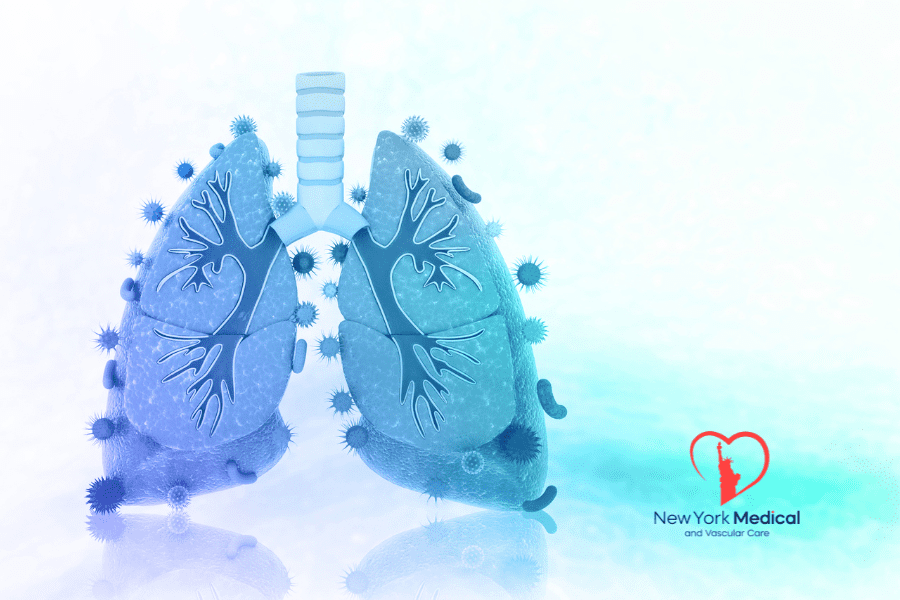Pneumonia is a serious infection that inflames the air sacs in one or both lungs, causing them to fill with fluid or pus. It can range from mild to life-threatening, affecting people of all ages but posing the greatest risk to young children, older adults, and individuals with weakened immune systems. At New York Medical and Vascular Care (NYMVCare), we believe in empowering our patients with knowledge to protect their health. Here’s what you need to know about pneumonia, its symptoms, prevention, and treatment options.
What is Pneumonia?
Pneumonia is an infection caused by bacteria, viruses, or fungi. The infection inflames the air sacs (alveoli) in the lungs, leading to symptoms that can interfere with breathing and overall health.
- Bacterial Pneumonia: The most common type, often caused by Streptococcus pneumoniae.
- Viral Pneumonia: Frequently caused by respiratory viruses, including influenza and COVID-19.
- Fungal Pneumonia: Typically affects individuals with compromised immune systems or those exposed to certain environments.
Symptoms of Pneumonia
Symptoms of pneumonia can vary depending on the type of infection and the patient’s age and overall health. Common signs include:
- Persistent cough, which may produce green, yellow, or bloody mucus.
- Fever and chills.
- Shortness of breath or rapid breathing.
- Chest pain, especially when breathing deeply or coughing.
- Fatigue and general weakness.
- Loss of appetite.
- Confusion or disorientation, particularly in older adults.
- Bluish lips or nails, a sign of severe oxygen deprivation.
If you or a loved one experiences these symptoms, particularly after a respiratory illness, it’s essential to seek medical attention promptly.
Prevention of Pneumonia
Preventing pneumonia involves reducing exposure to pathogens and maintaining a healthy immune system. Here are key strategies:
- Get Vaccinated: Vaccines, such as the pneumococcal vaccine and annual flu shot, are effective in preventing bacterial and viral pneumonia.
- Practice Good Hygiene: Wash your hands regularly and avoid close contact with sick individuals to minimize the spread of germs.
- Avoid Smoking: Smoking damages the lungs, making them more susceptible to infections.
- Strengthen Your Immune System: Eat a balanced diet, exercise regularly, and get adequate sleep to keep your immune system strong.
- Manage Chronic Conditions: Conditions like diabetes, asthma, or heart disease can increase your risk of pneumonia. Work with your healthcare provider to manage these effectively.
Treatment Options for Pneumonia
Treatment for pneumonia depends on its cause, severity, and the patient’s overall health. Common approaches include:
Antibiotics:
- Prescribed for bacterial pneumonia. Treatment usually leads to improvement within a few days.
Antiviral Medications:
- Used to treat viral pneumonia caused by influenza or COVID-19.
Antifungal Medications:
- Prescribed for fungal pneumonia, often requiring a longer treatment course.
Supportive Care:
- Rest and Hydration: Allow your body to recover while staying hydrated to thin mucus and ease breathing.
- Oxygen Therapy: In severe cases, oxygen therapy may be necessary to maintain adequate oxygen levels.
- Over-the-Counter Medications: Pain relievers like acetaminophen or ibuprofen can reduce fever and chest discomfort.
Hospitalization:
- Severe cases of pneumonia may require hospitalization, particularly for individuals with low oxygen levels, dehydration, or other complications.
When to See a Doctor
Seek medical attention immediately if you experience:
- Difficulty breathing or shortness of breath.
- Persistent high fever or chills.
- Confusion or severe fatigue.
- Chest pain that worsens with breathing or coughing.
- Bluish lips or nails.
Early diagnosis and treatment can prevent complications such as respiratory failure, sepsis, or lung abscesses.
Pneumonia Care at NYMVCare
At NYMVCare, we are dedicated to providing personalized care for patients with pneumonia and other respiratory conditions. Our team uses advanced diagnostic tools and tailored treatment plans to ensure the best outcomes for each patient. Whether it’s managing mild cases or providing care for severe infections, we are here to support you every step of the way.
Conclusion
Pneumonia is a serious condition that requires timely attention and appropriate care. By understanding its symptoms, taking preventive measures, and seeking treatment when needed, you can reduce your risk and recover more effectively. If you or a loved one is experiencing symptoms of pneumonia, don’t wait—schedule an appointment with NYMVCare today for expert diagnosis and care.
Written by DapraLab


